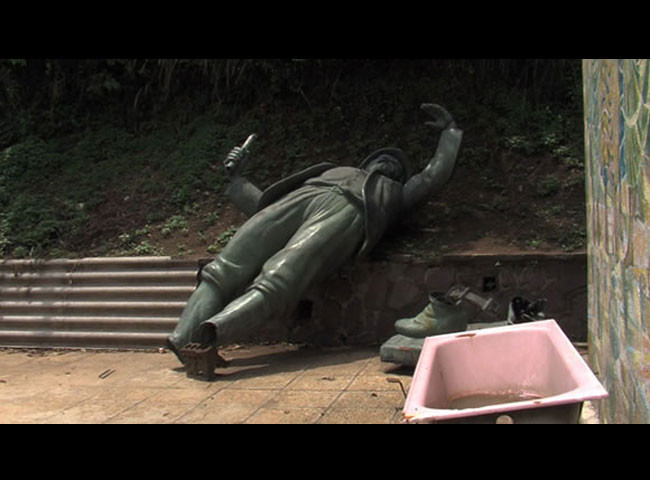Sven Augustijnen
15 Oct 2011 - 04 Mar 2012
SVEN AUGUSTIJNEN
Spectres
15 October, 2011 — 4 March, 2012
The Belgian artist Sven Augustijnen (Belgium, born 1970) made his name with films in which he analyses cultural and historical places and events from a personal perspective, in a way that is at the same time very precise and ambiguous. This autumn, Augustijnen is presenting his latest film, “Spectres”, as part of a solo exhibition in de Appel. In this film essay, the artist presents a controversial view of Belgian colonial history, a historical era that recently attracted a great deal of attention in the Netherlands following the publication of “Congo” by David van Reybrouck, who won the Libris prize. However, the questions raised by Augustijnen go beyond these national colonial events. How does a country or an individual deal with a colonial past? How does a nation process the suffering it has inflicted, dubious political acts or moral bankruptcy? Who is guilty, admits to guilt and what are they guilty of?
Film screening Spectres: 12 am, 2 pm and 4 pm (part of complete exhibition)
“Spectres” focuses on one of the darkest pages in the colonial history of the Belgian Congo in about 1960 in a documentary thriller, set to the music of Bach’s St. John’s Passion. Augustijnen follows Jacques Brassinne de La Buissière, a French-speaking Belgian who is now 82 years old and who was a high-ranking official when the prime minister of the Congo, Patrice Lumumba, was murdered in 1961. Brassinne conducted a personal investigation into the truth of this murder for thirty years. With his delicate psychological portrait, Augustjnen shows how the friction between personal involvement and an objective writing of history, between fact and fiction, truth and conviction, wholly obscures the question of guilt which arises.
The film is part of the overall “Spectres” project devoted to this difficult historical period, a project on which Augustijnen has been working in stages since 2001 and which has resulted in various works which are shown in the exhibition. For example, they include the installation “Les Demoiselles de Bruxelles” and the newspaper supplement “Panorama”, published with the Belgian newspaper, the Financieel Economisch Tijd, in which Augustijnen describes the interrelationship between the Belgian colonial issues and the history of the creation of the European Union.
The title of the project and the film are derived from the book by Jacques Derrida “Specters of Marx. The State of the Debt, the Work of Mourning, and the New International” (1993) in which the French philosopher discusses, amongst other things, the returning ghosts, the spectres of the past which reappear in the present again and again. Augustijnen’s project shows that Europe has not yet come to terms with its spectres, a colonial history which still has an impact on our lives, our way of thinking and our actions. In a time when the multicultural society appears to be under fire, a film about the way in which the West deals with “the other” is all the more relevant.
Spectres
15 October, 2011 — 4 March, 2012
The Belgian artist Sven Augustijnen (Belgium, born 1970) made his name with films in which he analyses cultural and historical places and events from a personal perspective, in a way that is at the same time very precise and ambiguous. This autumn, Augustijnen is presenting his latest film, “Spectres”, as part of a solo exhibition in de Appel. In this film essay, the artist presents a controversial view of Belgian colonial history, a historical era that recently attracted a great deal of attention in the Netherlands following the publication of “Congo” by David van Reybrouck, who won the Libris prize. However, the questions raised by Augustijnen go beyond these national colonial events. How does a country or an individual deal with a colonial past? How does a nation process the suffering it has inflicted, dubious political acts or moral bankruptcy? Who is guilty, admits to guilt and what are they guilty of?
Film screening Spectres: 12 am, 2 pm and 4 pm (part of complete exhibition)
“Spectres” focuses on one of the darkest pages in the colonial history of the Belgian Congo in about 1960 in a documentary thriller, set to the music of Bach’s St. John’s Passion. Augustijnen follows Jacques Brassinne de La Buissière, a French-speaking Belgian who is now 82 years old and who was a high-ranking official when the prime minister of the Congo, Patrice Lumumba, was murdered in 1961. Brassinne conducted a personal investigation into the truth of this murder for thirty years. With his delicate psychological portrait, Augustjnen shows how the friction between personal involvement and an objective writing of history, between fact and fiction, truth and conviction, wholly obscures the question of guilt which arises.
The film is part of the overall “Spectres” project devoted to this difficult historical period, a project on which Augustijnen has been working in stages since 2001 and which has resulted in various works which are shown in the exhibition. For example, they include the installation “Les Demoiselles de Bruxelles” and the newspaper supplement “Panorama”, published with the Belgian newspaper, the Financieel Economisch Tijd, in which Augustijnen describes the interrelationship between the Belgian colonial issues and the history of the creation of the European Union.
The title of the project and the film are derived from the book by Jacques Derrida “Specters of Marx. The State of the Debt, the Work of Mourning, and the New International” (1993) in which the French philosopher discusses, amongst other things, the returning ghosts, the spectres of the past which reappear in the present again and again. Augustijnen’s project shows that Europe has not yet come to terms with its spectres, a colonial history which still has an impact on our lives, our way of thinking and our actions. In a time when the multicultural society appears to be under fire, a film about the way in which the West deals with “the other” is all the more relevant.

